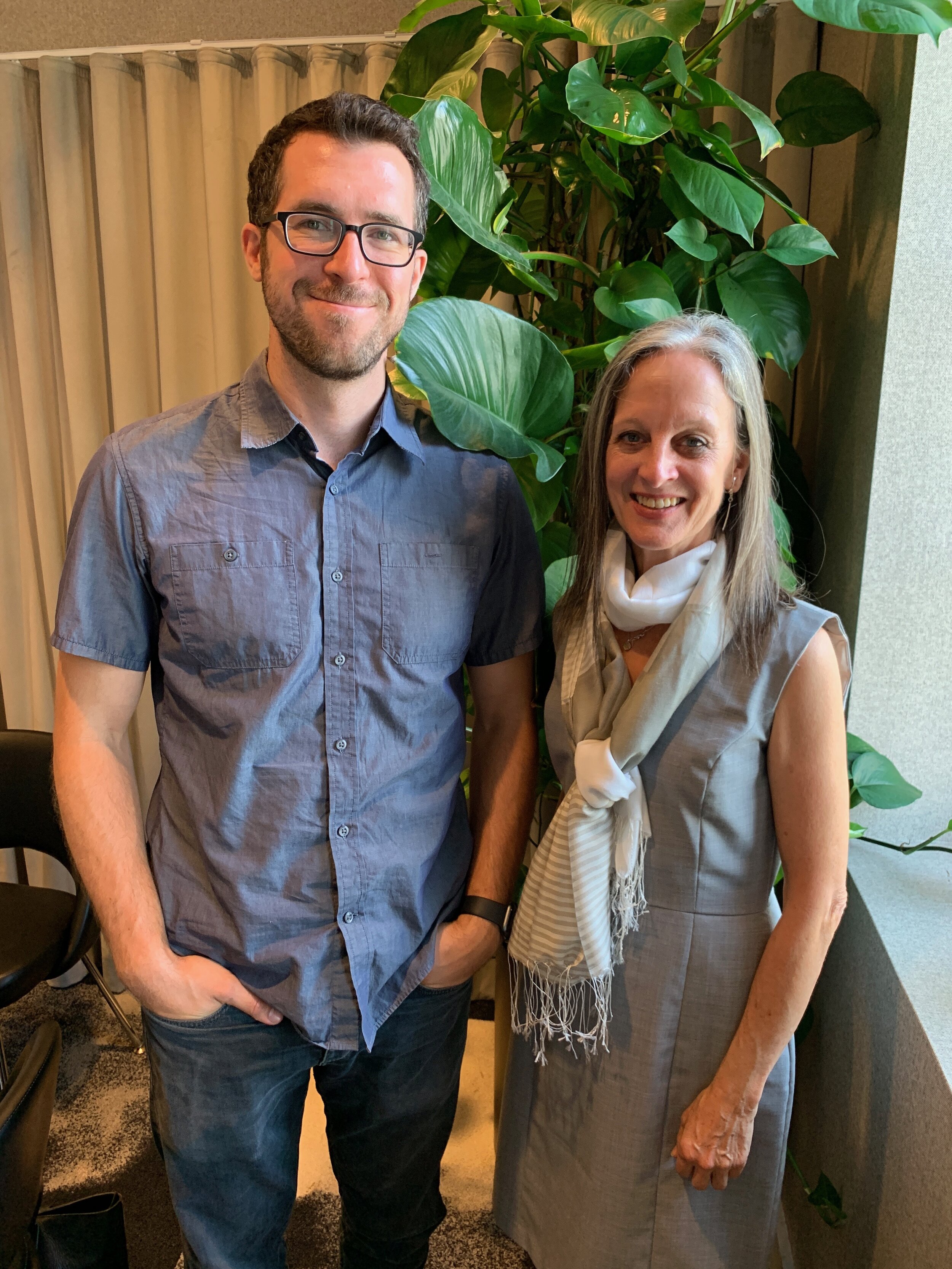Episode #60: Catherine Rogers & Ben Samuel
Catherine Rogers MFA, MS, a playwright and performer, has been on the faculty of the Program for Narrative Medicine at Columbia University since 2015. She facilitates Narrative Medicine seminars at hospitals, medical schools, and universities in the US and abroad including Mt. Sinai, Brooklyn Lutheran, Columbia Presbyterian, York PA Hospitals, Georgetown School of Medicine, Pace University, Aristotle University, and the University of Athens. A two-time Fulbright fellow, she has been offering creative writing and Narrative Medicine programs in Greece since 2009. Catherine is Guest Editor for the International Association of Theatre Critics Critical Stages/Scènes critiques special issue “Medicine and/in Theatre” (June 2018). Her work is published in the Gettysburg Review; in Voices Made Flesh: Performing Women’s Autobiography (University of Wisconsin); and in Our Changing Journey to the End: Reshaping Death (Praeger). Her plays have been seen at Dixon Place, Manhattan Theatre Source, Salvage Vanguard TX, and Cleveland Public Theatre among others. Catherine holds the MS in Narrative Medicine from Columbia as well as the MFA in Playwriting from the University of Texas where she was a Fellow at the Michener Center for Writers.
Ben Samuel is the Co-Founder of Electric Literature's Recommended Reading. He serves on the National Book Foundation's Book Council as well as on the Brooklyn Book Festival's Literary Council and Fiction Committee. He has an MFA from Brooklyn College, and his work has been published by McSweeney's, the New York Daily News, Guernica, Men's Journal, The Literary Hub, Publishers Weekly, and elsewhere.
Developed at Columbia University in 2000, narrative medicine isn’t quite like any other discipline out there. There’s a focus on creative writing, but it’s not the same as an MFA program. It has a therapeutic element, but it’s different from drama therapy and art therapy. And it’s not just for one type of student; it’s for anyone, in healthcare and beyond, who believes that understanding narratives can improve the experiences of people in medicine. On today’s episode, I talk with Catherine Rogers and Ben Samuel, who both teach writing in the Program in Narrative Medicine at Columbia. We discuss what students learn in narrative medicine creative writing classes, how an education in narrative medicine can translate to medical settings, and how the program, with its students from many different backgrounds, is like a one-room schoolhouse.
“As young pre-meds, they’re thinking, I want to be a doctor but I don’t want to treat diseases—I want to treat people.”
Here are some of the things Catherine, Ben, and I chatted about:
How the narrative medicine program at Columbia was founded, and how it bridges disciplines
Why the program takes the craft of writing seriously, and how that helps with self-expression
The kinds of students who are attracted to narrative medicine--from doctors to scholars
Using the program’s curriculum to help students develop a more empathetic bedside manner
How reading literature and studying characters can help physicians understand patients better
The challenges that people in healthcare face, and how the program provides a bit of respite
The creative writing curriculum, and how the human condition ties all the work together
The value in students sharing what they’ve written (and how that process is unlike in an MFA)
Why the requirements of each student includes courses outside their typical focus or interests
The three principles of narrative medicine, and the book that explores this topic in-depth
How writing can particularly help people dealing with invisible illnesses and experiences
Being surprised while writing a character, and how that translates on a personal level
The most rewarding aspect, for both Catherine and Ben, of teaching narrative medicine
Ways to engage with narrative medicine even if you can’t commit to a master’s program
“Some philosophers would say you’re not thinking until you actually put it out there in words.”
Learn more about the Program in Narrative Medicine at Columbia University: Website / Book / Events
In this episode, Ben and Catherine are speaking from their individual experiences in the Program in Narrative Medicine, and our thoughts and opinions do not necessarily reflect the official policies and positions of the Division of Narrative Medicine or of Columbia University.
Support for this episode comes from Betterhelp. Betterhelp is an online counseling service that matches you with a licensed professional therapist. No matter where you are in the world, Betterhelp lets you schedule video and phone sessions with your therapist, or even text them. Plus, they’ll work with you to find a counselor you love. It’s not self help, it’s better help. Take 10% off your first month of Betterhelp by visiting betterhelp.com/madevisible and entering promo code MADEVISIBLE.


